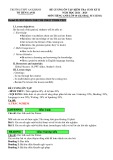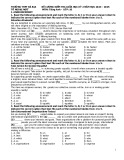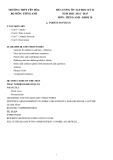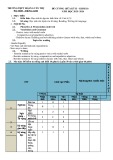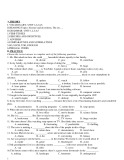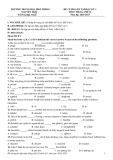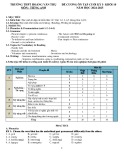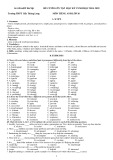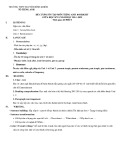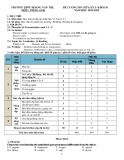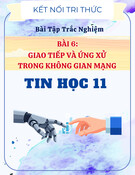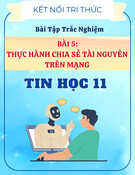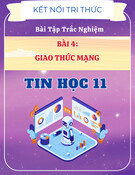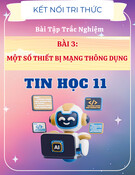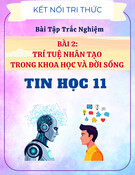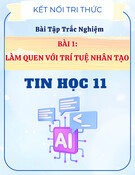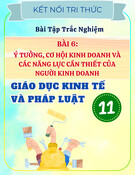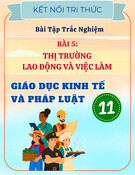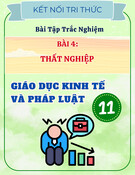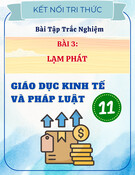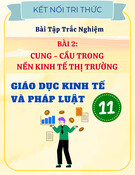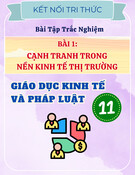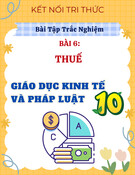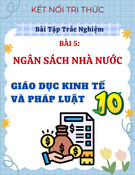
UNIT 4. FOR A BETTER COMMUNITY - KEY
PART 1: VOCABULARY AND GRAMMAR REVIEW
A. VOCABULARY
annoying (adj.) gây khó ch u, phi n ph cị ề ứ
annoyed (adj.) khó ch uị
boring (adj.) chán ng t, t nh tắ ẻ ạ
bored (adj.) c m th y nhàm chánả ấ
dedicated (adj.) t n t yậ ụ
hopeless (adj.) vô v ngọ
hopeful (adj.) l c quan, tràn đy hi v ngạ ầ ọ
helpless (adj.) b t l cấ ự
helpful (adj.) h u ích, nhi t tìnhữ ệ
meaningless (adj.) vô nghĩa
meaningful (adj) có ý nghĩa
charity organization (n. phr.) t ch c t thi nổ ứ ừ ệ
charity work (n. phr) công vi c t thi nệ ừ ệ
community (n.) c ng đngộ ồ
develop (n.) phát tri nể
development (n.) s phát tri nự ể
disadvantaged (adj) thi t thòi, có hoàn c nh khó khănệ ả
donate (v.) quyên góp ng hủ ộ
donation (n.) s quyên góp, kho n ti n quyên gópự ả ề
donor (n.) nhà tài tr , ng i ng hợ ườ ủ ộ
handicapped (adj) khuy t t tế ậ
low-income (adj.) thu nh p th pậ ấ
needy (adj.) túng thi u, nghèoế
priority (n.) u tiênư
volunteer (n.) tình nguy n viênệ
volunteer (v.) tình nguy nệ
volunteer work (n. phr) công vi c tình nguy nệ ệ
advertisement (n.) qu ng cáoả
application (n.) s xin vi c, ng tuy nự ệ ứ ể
benefit (n.) l i íchợ

childless people (n. phr) nh ng ng i không có conữ ườ
concerned (adj.) quan tâm, lo l ng ắ
direct the traffic (v.) h ng d n giao thôngướ ẫ
experience (n.) kinh nghi mệ
facility (n.) c s v t ch t, trang thi t bơ ở ậ ấ ế ị
interact (v.) t ng tác, ti p xúcươ ế
job market (n. phr) th tr ng lao đng vi c làmị ườ ộ ệ
martyr (n.) li t sĩệ
narrow-minded (adj.) h p hòi, nh nhenẹ ỏ
non-profit (adj.) phi l i nhu nợ ậ
passionate (adj) đam mê, n ng nhi tồ ệ
position (n.) v trí ị
reference (n.) th gi i thi uư ớ ệ
remote area (n. phr) vùng sâu vùng xa
running water (n. phr) n c máyướ
rural area (n. phr) vùng nông thôn
urgent (adj.) c p bách, kh n c pấ ẩ ấ
widen roads (v) m r ng đng xáở ộ ườ
B. GRAMMAR
I. PAST SIMPLE & PAST CONTINUOUS
Thì Quá kh đn và thì Quá kh ti p di nứ ơ ứ ế ễ
1. D ng th c c a đng tạ ứ ủ ộ ừ
a. Thì Quá kh đnứ ơ
Đng t to beộ ừ
S + was / were + ...
Trong đó:
• was đi v i các ch ng s ít: ớ ủ ữ ố I, He, She, It, ...
• were đi v i: ớYou, We, They, và các ch ng s nhi u khác.ủ ữ ố ề
Đng t th ngộ ừ ườ
S + V (past simple) + ...
Trong đó:
• Thêm "ed" n u đó là đng t có quy t c. ế ộ ừ ắ

• Không thêm "ed" mà bi n đi khác n u là đng t b t quy t c.ế ổ ế ộ ừ ấ ắ
M T S ĐNG T B T QUY T C TH NG G PỘ Ố Ộ Ừ Ấ Ắ ƯỜ Ặ
become became→go went→ring rang→
bring brought→have had→see saw→
buy bought→make made→teach taught→
do did→meet met→wear wore→
read read→write wrote→get got→
Ex: He visited some palaces. C u y đã đi thăm m t s lâu đài.ậ ấ ộ ố
Đng t visit đc thêm đu i ed thành visited - d ng quá kh đn c a đngộ ừ ượ ổ ạ ứ ơ ủ ộ
t visit.ừ
It began to rain. Tr i đã b t đu m a. ờ ắ ầ ư
Trong ví d này, đng t begin bi n đi thành began vì đây là đng t b t ụ ộ ừ ế ổ ộ ừ ấ
quy t c.ắ
2. Thì Quá kh ti p di nứ ế ễ
S + was / were + V-ing + …
Trong đó: + was đi v i các ch ng s ít: ớ ủ ữ ố I, He, She, It, ...
+ were đi v i: ớYou, We, They, và các ch ng s nhi u khác. ủ ữ ố ề
Ex: Andy was staying in Paris. Andy đang Paris.ở
Đng t stay chia thành was staying t ng ng v i ch ng s ít là Andy.ộ ừ ươ ứ ớ ủ ữ ố
We were walking in the park. Chúng tôi đang đi b trong công viên.ộ
Đng t walk chia thành were walking t ng ng v i ch ng s nhi u là ộ ừ ươ ứ ớ ủ ữ ố ề
We.
II. KHÁC BI T TRONG CÁC CÁCH S D NG Ệ Ử Ụ
1. Khác bi t 1 ệ
• Thì quá kh đn dùng đ di n t m t hành đng ứ ơ ể ễ ả ộ ộ đã hoàn thành t i m t th i đi m trong ạ ộ ờ ể
quá kh . ứ
• Thì quá kh ti p di n nh n m nh s vi c ứ ế ễ ấ ạ ự ệ đang x y raả t i m t th i đi m trong quá kh . ạ ộ ờ ể ứ
Ex: I did my homework at 4 p.m. yesterday.
T đã làm xong bài t p lúc 4h chi u hôm qua. - s vi c đã hoàn thành vào ớ ậ ề ự ệ
4h chi u qua. ề
I was doing my homework at 4 p.m. yesterday.
T đang làm bài t p vào lúc 4h chi u qua. -v n đang di n ra, ch a hoàn ớ ậ ề ẫ ễ ư
thành vào 4h chi u qua.ề
My parents got up at 5.30 a.m. yesterday.

Sáng hôm qua b m t d y lúc 5h30. ố ẹ ớ ậ
My sister and I were sleeping at 5.30 yesterday.
Ch t và t v n đang ng lúc 5.30 sáng qua.ị ớ ớ ẫ ủ
2. Khác bi t 2 ệ
• Thì quá kh đn: di n t m t chu i các hành đng trong quá kh , hành đng này x y ra ứ ơ ễ ả ộ ỗ ộ ứ ộ ả
sau hành đng khác. Th ng dùng k t h p v i các t n i nh ộ ườ ế ợ ớ ừ ố ư and hay then.
• Thì quá kh ti p di n: di n t ứ ế ễ ễ ả các hành đng x y ra song song đng th iộ ả ồ ờ . Th ng s ườ ử
d ng liên t ụ ừ while, có nghĩa là trong khi.
Ex: She came home, opened the window and turned on the TV.
Cô y v nhà, m c a s và b t tivi. - m t chu i các hành đng di n ra l n ấ ề ở ử ổ ậ ộ ỗ ộ ễ ầ
l t. ượ
She was watching TV while her husband was cooking.
Cô y đang xem tivi trong khi ch ng cô y đang n u c m. - 2 hành đng x yấ ồ ấ ấ ơ ộ ả
ra cùng lúc
She came in the room and then looked around for a seat.
Cô y vào phòng và sau đó tìm m t gh đ ng i. ấ ộ ế ể ồ
He was playing a mobile game while the teacher was speaking.
C u y đang ch i game trên đi n tho i di đng trong khi cô giáo đang ậ ấ ơ ệ ạ ộ
gi ng bài.ả
III. K T H P THÌ QUÁ KH ĐN VÀ QUÁ KH TI P DI NẾ Ợ Ứ Ơ Ứ Ế Ễ
K t h p thì quá kh đn và quá kh ti p di n, s d ng ế ợ ứ ơ ứ ế ễ ử ụ when ho c ặwhile đ di n t m t ể ễ ả ộ
hành đng đang x y ra thì hành đng khác xen vào.ộ ả ộ
• Thì quá kh ti p di n đc dùng đ di n t hành đng ứ ế ễ ượ ể ễ ả ộ đang x y ra, th ng là dài h n, ả ườ ơ
lâu h nơ và đc đi v i ượ ớ while ho c ặwhen.
• Thì quá kh đn di n t hành đng ứ ơ ễ ả ộ xen vào và ch đi v i ỉ ớ when .
L U Ý: Ư
• Khi When ho c ặWhile đng đu câu thì c n có d u ph y ngăn cách 2 m nh đ. ứ ầ ầ ấ ẩ ệ ề
• Khi when ho c ặwhile đng gi a 2 m nh đ thì không c n d u ph y. ứ ữ ệ ề ầ ấ ẩ
• Không dùng when và while trong cùng m t câu. ộ
Ex: When the phone rang, we were having dinner.
Khi đi n tho i kêu, chúng tôi đang ăn t i.ệ ạ ố
Trong ví d trên, ụthe phone rang là vi c xen vào nên chia quá kh đn và đi v i ệ ở ứ ơ ớ When,
còn we were having dinner là vi c đang x y ra nên chia thì quá kh ti p di n.ệ ả ở ứ ế ễ
Câu trên cũng có th vi t thành: ể ế

The phone rang while we were having dinner.
Đi n tho i kêu trong khi chúng tôi đang ăn t i.ệ ạ ố
Trong câu này, we were having dinner chia thì quá kh ti p di n, đi v i ở ứ ế ễ ớ while. Liên t ừ
while đng gi a câu nên không c n d u ph y.ứ ở ữ ầ ấ ẩ
When the teacher asked me a question, I wasn't listening.
Khi cô giáo h i tôi, tôi đang không chú ý l ng nghe. ỏ ắ
We arrived at school while it was raining. (We arrived at school when it was
raining.)
Chúng tôi đn tr ng trong khi tr i đang m a.ế ườ ờ ư
PART 2: EXERCISES
A. PHONETICS
I. Choose the word that has the underlined part pronounced differently from the
others'.
1. A. disadvantaged B. handicapped C. bored D. annoyed
2. A. donation B. priority C. hopeless D. low-income
3. A. development B. dedicated C. devoted D. describe
4. A. development B. improvement C. documentary D. environment
5. A. organisation B. disadvantaged C. meaningless D. obvious
II. Choose the word that has the underlined partpronounced differently from the
others'.
1. A. rural B. surprise C. successful D. volunteer
2. A. application B. benefit C. non-profit D. narrow-minded
3. A. reference B. remote C. reaction D. creation
4. A. area B. market C. martyr D. archaeology
5. A. development B. demonstrate C. dedicated D. delicate
B. VOCABULARY AND GRAMMAR
I. Choose the options that best fit the blanks.
1. Your music is very ____. Can't you just stop it?
A. annoying B. interesting C. annoyed D. bored
2. If you can do something to help others, you will find your life ____.
A. meaningful B. meaningless C. helpless D. interested
3. Some of the students were ____ at English, so volunteer teachers had to try very hard.
A. hopeless B. hopeful C. endless D. excited

